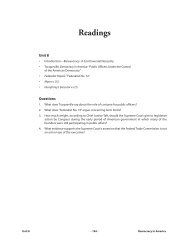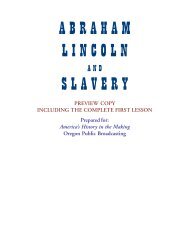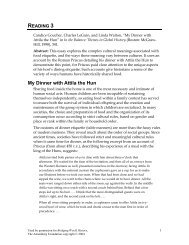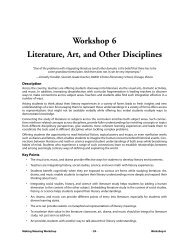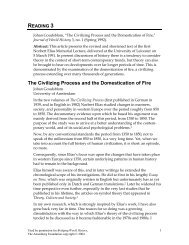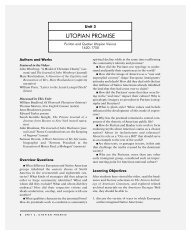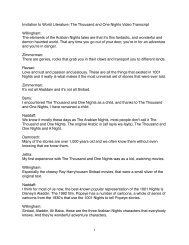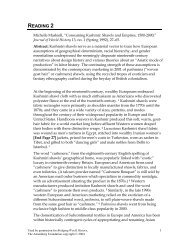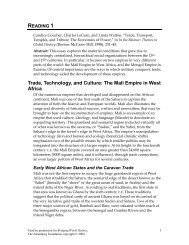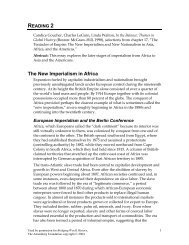Ethics Reader
Ethics Reader
Ethics Reader
Create successful ePaper yourself
Turn your PDF publications into a flip-book with our unique Google optimized e-Paper software.
Cr. He ought to do what he thinks right.<br />
Soc. But if this is true, what is the application? In leaving the prison against the will of the<br />
Athenians, do I wrong any? or rather do I not wrong those whom I ought least to wrong?<br />
Do I not desert the principles which were acknowledged by us to be just? What do you say?<br />
Cr. I cannot tell, Socrates, for I do not know.<br />
Soc. Then consider the matter in this way: Imagine that I am about to play truant (you may<br />
call the proceeding by any name which you like), and the laws and the government come and<br />
interrogate me: "Tell us, Socrates," they say; "what are you about? are you going by an act of<br />
yours to overturn us—the laws and the whole State, as far as in you lies? Do you imagine<br />
that a State can subsist and not be overthrown, in which the decisions of law have no power,<br />
but are set aside and overthrown by individuals?" What will be our answer, Crito, to these<br />
and the like words? Anyone, and especially a clever rhetorician, will have a good deal to urge<br />
about the evil of setting aside the law which requires a sentence to be carried out; and we<br />
might reply, "Yes; but the State has injured us and given an unjust sentence." Suppose I say<br />
that?<br />
Cr. Very good, Socrates.<br />
Soc. "And was that our agreement with you?" the law would say, "or were you to abide by<br />
the sentence of the State?" And if I were to express astonishment at their saying this, the law<br />
would probably add: "Answer, Socrates, instead of opening your eyes: you are in the habit of<br />
asking and answering questions. Tell us what complaint you have to make against us which<br />
justifies you in attempting to destroy us and the State? In the first place did we not bring you<br />
into existence? Your father married your mother by our aid and begat you. Say whether you<br />
have any objection to urge against those of us who regulate marriage?" None, I should reply.<br />
"Or against those of us who regulate the system of nurture and education of children in<br />
which you were trained? Were not the laws, who have the charge of this, right in<br />
commanding your father to train you in music and gymnastic?" Right, I should reply. "Well,<br />
then, since you were brought into the world and nurtured and educated by us, can you deny<br />
in the first place that you are our child and slave, as your fathers were before you? And if this<br />
is true you are not on equal terms with us; nor can you think that you have a right to do to<br />
us what we are doing to you. Would you have any right to strike or revile or do any other<br />
evil to a father or to your master, if you had one, when you have been struck or reviled by<br />
him, or received some other evil at his hands?—you would not say this? And because we<br />
think right to destroy you, do you think that you have any right to destroy us in return, and<br />
your country as far as in you lies? And will you, O professor of true virtue, say that you are<br />
justified in this? Has a philosopher like you failed to discover that our country is more to be<br />
valued and higher and holier far than mother or father or any ancestor, and more to be<br />
regarded in the eyes of the gods and of men of understanding? also to be soothed, and gently<br />
and reverently entreated when angry, even more than a father, and if not persuaded, obeyed?<br />
And when we are punished by her, whether with imprisonment or stripes, the punishment is<br />
to be endured in silence; and if she leads us to wounds or death in battle, thither we follow<br />
as is right; neither may anyone yield or retreat or leave his rank, but whether in battle or in a<br />
court of law, or in any other place, he must do what his city and his country order him; or he<br />
must change their view of what is just: and if he may do no violence to his father or mother,<br />
Page 13



